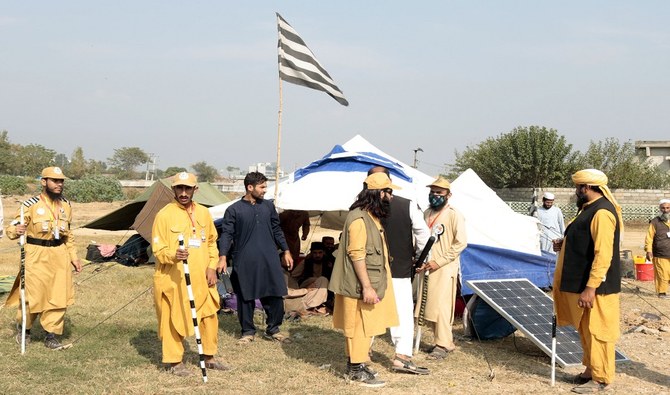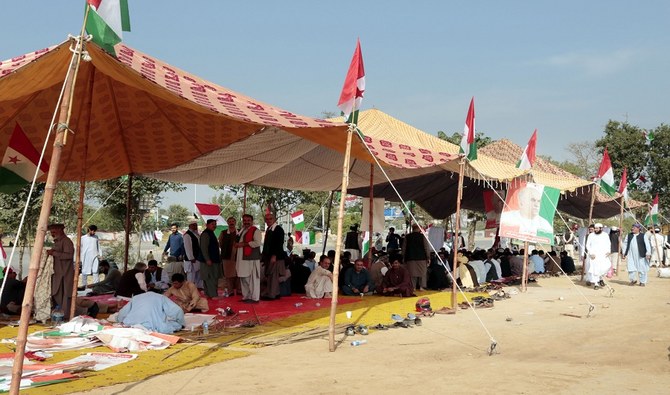ISLAMABAD: Pakistan opposition party Jamiat Ulema-e-Islam’s (JUI-F) protest caravan reached Islamabad on Thursday night to hold a mass anti-government demonstration on Friday.
The protesters seek Prime Minister Imran Khan’s resignation and demand fresh elections in the country. Maulana Fazal-ur-Rehman, Chief of the JUI-F, will address a huge public gathering at the venue provided by Islamabad administration which desperately seeks to secure sensitive government installations and diplomatic enclave.
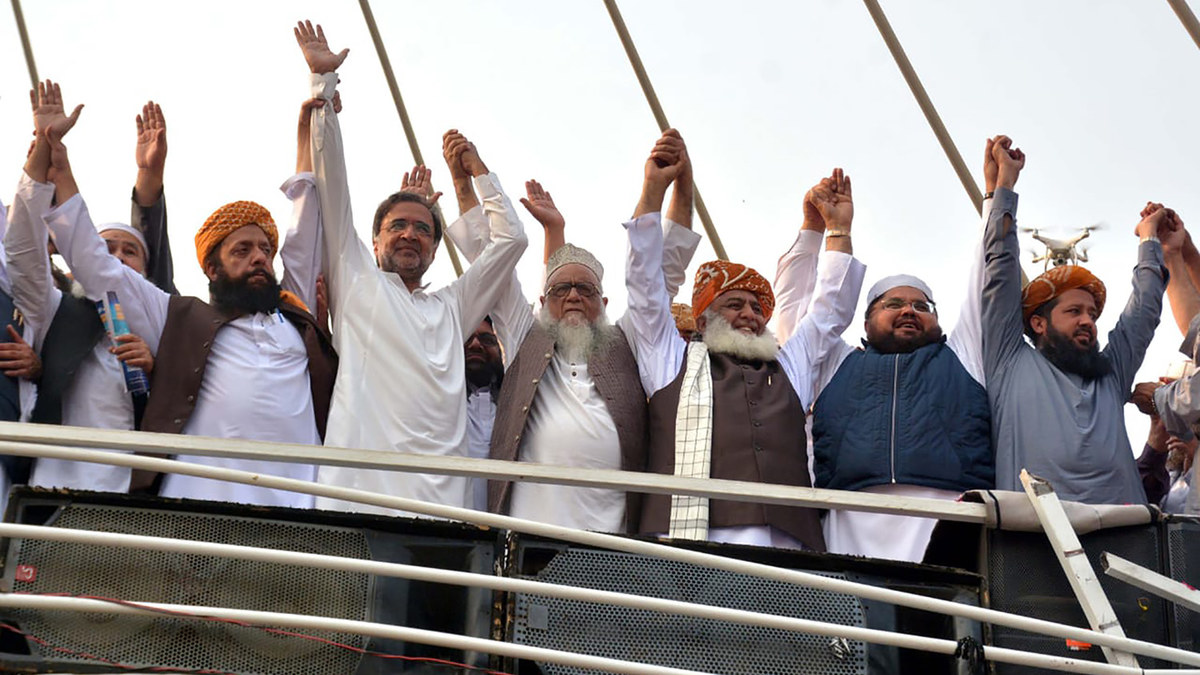
Leaders of opposition parties – Qamar Zaman Kaira of Pakistan People’s Party and Sajid Mir of Jamiat Ahle Hadith – share the stage with JUI-F leaders in Lahore on Oct. 30, 2019. (AN Photo by Shafiq Malik)
The JUI-F chief Maulana Fazal-ur-Rehman’s caravan set off from Karachi in southern Pakistan on Sunday while party activists and demonstrators from other parts of the country, including Khyber Pakhtunkhwa and Balochistan provinces, have also reached Islamabad to participate in the anti-government rally.
The firebrand religious leader has been mobilizing the general public and his party activists since July last year against the Pakistan Tehreek-e-Insaf (PTI) government that he believes is a “product of rigging in last year’s general elections.” The government and the Election Commission of Pakistan deny the charge.
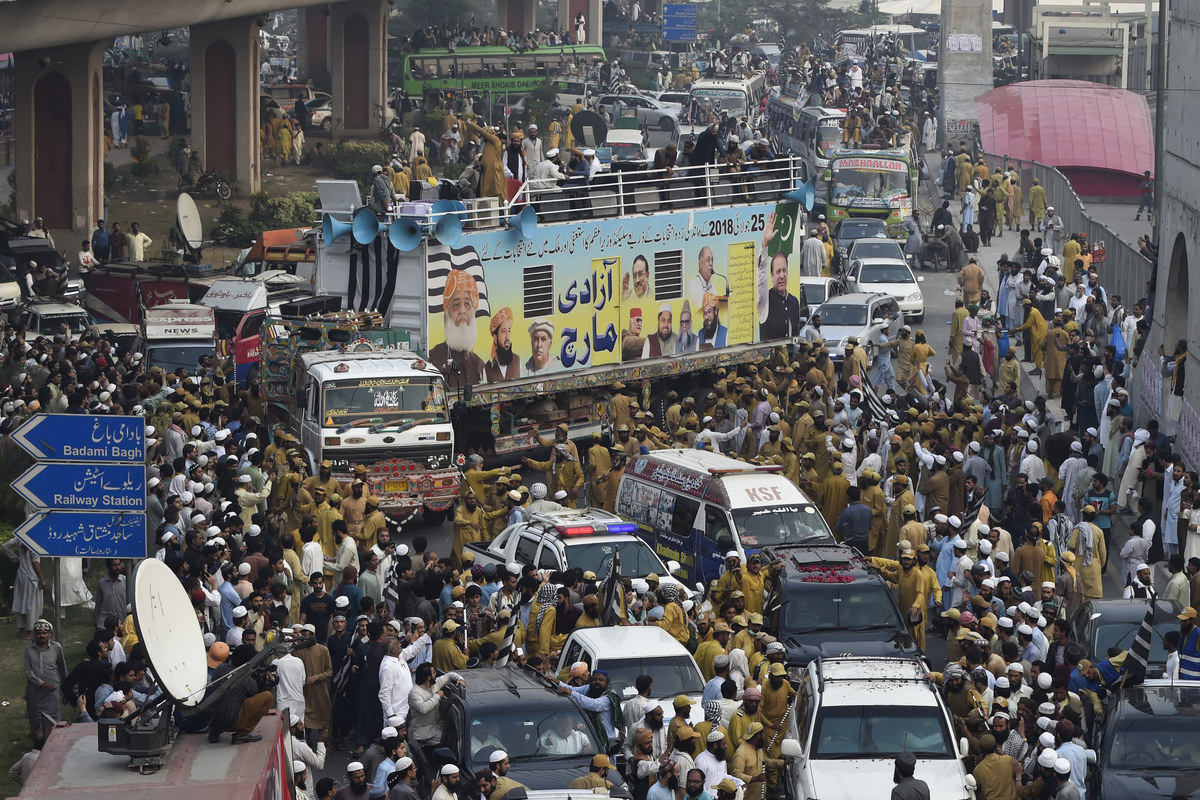
Activists and supporters of the Jamiat Ulema-e-Islam party gather during an anti-government "Azadi March" towards Islamabad, in Lahore on October 30, 2019. Pakistan Prime Minister Imran Khan faces the first major challenge to his leadership as a grey-bearded, orange-turbaned rival he calls "Maulana Diesel" marches to Islamabad with thousands of Islamists hoping to bring down the government. (AFP)
Earlier in the day, the government said that it would provide security and utilities to demonstrators led by Jamiat Ulema-e-Islam (JUI-F) on the protest venue in Islamabad, but would not allow them to disrupt public life, damage national security, and image of the country.
“We are making all-out efforts to provide complete security and utilities [water and electricity] to protesters and expect them to remain within limits of law and constitution,” said Minister for Interior Brig. (retd) Ejaz Shah while addressing a press conference in Islamabad along with Firdous Ashiq Awan, a special assistant to Prime Minister Imran Khan on information and broadcasting.
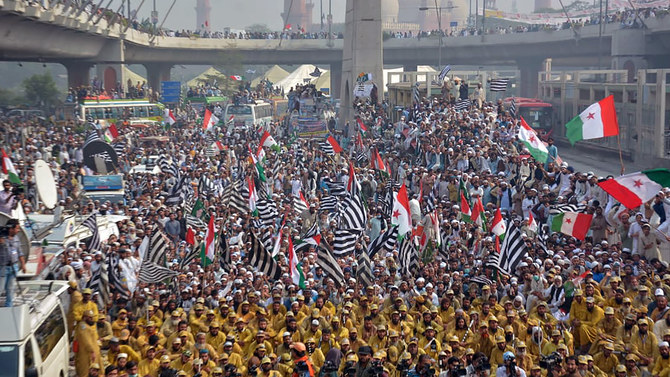
Participants of the JUI-F-led Azadi March can be seen chanting slogans at a public gathering in Lahore on Oct. 30, 2019. (AN Photo by Shafiq Malik)
Islamabad has already been put on high-alert as anti-government protesters led by JUI-F chief Maulana Fazal-ur-Rehman are scheduled to enter the federal capital by Thursday evening to seek the resignation of Prime Minister Imran Khan through a show of strength.
“All those who wanted to create unrest in Islamabad [under the garb of the march] were disappointed after the government allowed JUI-F to hold its peaceful protest,” the interior minister said.
Fazal-ur-Rehman is a veteran politician who heads an alliance with several seats in the National Assembly and provincial assemblies. But his real influence comes from his ability to mobilize support, particularly in numerous religious schools, or madrasas, across the country. He has labeled Prime Minister Khan’s government as “illegitimate” and sought fresh elections in the country.
“We have allowed a peaceful protest … and it is our responsibility to ensure the security of public and at least 7,000 members of diplomatic corps in Islamabad,” Awan said while warning protesters against crossing the red lines.
She said the diplomatic corps in Islamabad “reflects an image of Pakistan in the world,” therefore the government would not allow any unrest in the federal capital.
The United Nations declared Islamabad to be a “non-family station” in 2008 after a terrorist attack, but this was recently reversed due to the prime minister’s international image building efforts, she said.
Khan won last year’s election on a promise to end corruption, generate at least ten million new jobs to help middle-class families but the economy is running into headwinds and inflation jumped to the highest level in decades after his government signed off a $6 billion bailout package with the International Monetary Fund in July this year to stave off a balance of payments crisis.
JUI-F chief and other opposition leaders have been trying to capitalize on anger and frustration of the general public against Khan’s government, though the prime minister has recently been quoted by media saying that he would neither resign nor be “blackmailed” by the protesters.




